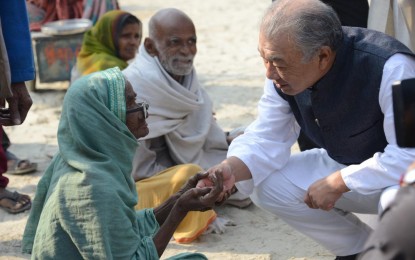
ZERO LEPROSY CAMPAIGN. Yohei Sasakawa, chairman of the Nippon Foundation and the World Health Organization (WHO) goodwill ambassador for leprosy elimination, is in Manila ahead of the International Leprosy Congress. He has been advocating for elimination of leprosy for the last 40 years. (Photo courtesy of Sasakawa Health Foundation/The Nippon Foundation)
MANILA -- World Health Organization’s (WHO) Goodwill Ambassador for Leprosy Elimination Yohei Sasakawa called on academics, medical stakeholders, and those affected by the disease to unite towards “Zero Leprosy”.
Sasakawa, chairperson of The Nippon Foundation (TNF) -- one of Japan’s largest private organizations, is attending two key global conferences on the diseases -- the first is the Global Forum of People’s Organizations on Hansen’s disease (leprosy) slated Sept. 7-10 and the 20th International Leprosy Congress (ILC) to be held from Sept. 11 to 13 this year.
Sasakawa, recipient of the 2019 Order of the Rising Sun as well as the 2018 Gandhi Peace Prize, will also call on experts to continue working on discovering the causes of transmission of the disease but to also continue developing vaccines, and create prosthetics and orthotics for those with Hansen’s disease.
“With globalization, human mobility and migration are increasing. Leprosy remains a global disease, even though the number of medical specialists is decreasing rapidly worldwide,” Sasakawa said.
People with Hansen’s disease face severe social stigma and widespread discrimination about the disease and organizations representing them want a greater voice in creating solutions.

For the last 40 years, Sasakawa has been a leading figure in the global fight against Hansen’s disease.
He has visited more than 90 countries and met more than 150 national leaders, including presidents and prime ministers, sharing his message and gaining their support and commitment to eliminate leprosy.
Significant contributions to leprosy elimination:
• Since 1975 TNF and its sister organization, Sasakawa Health Foundation (SHF), have contributed over USD200 million in financial support for the WHO’s Global Leprosy program. This funding also covered the free distribution of multi-drug therapy (MDT) from 1995 until 1999 when Novartis took over provision of the drug.
• Sasakawa’s advocacy for discrimination against people with leprosy to be included in the United Nations human rights agenda, resulted in the landmark 2010 United Nations General Assembly Resolution on elimination of discrimination against persons affected by leprosy and their family members and accompanying principle and guidelines.
• TNF and SHF have supported 23 organizations in 16 countries that are working to promote the social and economic rehabilitation of persons affected by leprosy.
• TNF and SHF have organized a number of conferences, symposiums and workshops to raise awareness around Hansen’s disease such as International Symposium “Towards Holistic Care for People with Hansen’s Disease, Respectful of their Dignity” at the Vatican in 2016 and National Leprosy Conference in Myanmar in 2018.
The Global Forum
The Global Forum, organized by TNF and SHF, is a gathering of delegates from organizations of persons affected by Hansen’s disease, as well as other stakeholders representing public health, charitable, and social services organizations.
Almost 100 participants from 23 countries across Africa, Asia, Latin America, and the Caribbean will share their know-how and experiences in eliminating Hansen’s disease, or leprosy as it is commonly known.
Among the objectives of the Global Forum of People’s Organizations on Hansen’s disease are:
• A key objective of the forum will be to explore ways to enhance the organizations’ influence over health policy in their respective countries.
• Another objective of the global forum will be to focus on organizational sustainability and capacity to enable the organizations to achieve their long-term goals.
“Our role is to provide a platform for people’s organizations to discuss the issues that matter to them. The Global Forum is their meeting. We hope they will use the opportunity to network, learn from each other, and make their voices heard as never before,” according to SHF.
“Ahead of the 20th International Leprosy Congress, they can provide a “people’s perspective” on leprosy and what still needs to be done,” it added.
Attendees of the forum are also scheduled to hear from Dr. Francine Laxamana, Assistant Secretary of the Philippines Department of Health, Dr. Alice Cruz, United Nations Special Rapporteur for Human Rights, and Dr. Huong Tran, Director of Diseases Control Division at WHO Regional Office for the Western Pacific.
International Leprosy Congress
Following the global forum, the 20th ILC, hosted by the Philippine Department of Health, will take place. A key objective of the ILC will be to assess the progress of the WHO’s Global Leprosy Strategy 2016-2020.
Delegates from the Global Forum will provide a “people’s perspective” on efforts to combat Hansen’s disease at the ILC.
Sasakawa will speak to experts and stakeholders at the ILC on September 11.
“This is probably the only academic conference in the world in which persons affected by the disease participate so actively,” said Sasakawa. (PR)
